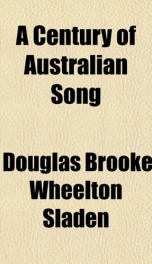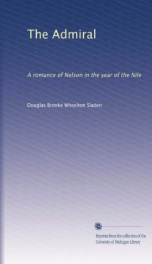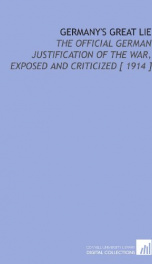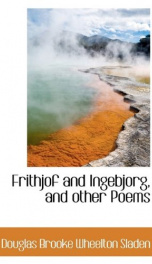a century of australian song

Purchase of this book includes free trial access to www.million-books.com where you can read more than a million books for free. This is an OCR edition with typos. Excerpt from book: is a poet who really had something in him, and has suffered undeserved neglect in Australia of late years. So has John Dunmore Lang, who, though not a writer of striking originality, wrote some poems worthy of himself; and he was once a power in the land, a man to whom Australia is under a heavy debt of gratitude. So has Sir Henry Parkes, now, and often before, Premier of New South Wales, been much underrated as a poet. His critics have some of them been his political enemies, and have concentrated attention on the obviously weak points of his writing. But Parkes is, in his inspiration, a true poet, with the deep voice of humanity in him ; he has something to say worth the hearing, and can say it emphatically. Only two of Gerald H. Supple's poems have come into our hands. The opening ballad in " The Dream of Dampier " has something of the spiritedness of Tennyson's "Revenge," and the ballad-pieces in "Ranolf and Amohia," but Supple lacks the ease of the Laureate, and Domett. There is an inevitableness in the rhythm of the great New Zealand poem. Domett had such an instinct for the fit word, the fit metrical effect; as, for instance, in " The Legend of Tawhaki" or "The Haunted Mountain." Francis W. L. Adams, a journalist well known in Australia, is also a real poet, though we cannot agree with his new methods of versification, which however we do not, with some of his critics, regard as slipshodness so much as a deliberate attempt to strike out a new metrical system between the ordinarily received one and that of Walt Whitman. We wonder what the good-natured critic in the Globe, who regretted that Australia had struck out no new style of expression, would have to say to Francis Adams. His book is fascinating -- eminently interesting. One always feels inclined to read just one m...
Info about the book
Author:
Series:
Unknown
ISBN:
5878055856
Rating:
5/5 (4)Your rating:
0/5
Languge:
English
Users who have this book
Users who want this book
What readers are saying
What do you think? Write your own comment on this book!
write a commentGenre
if you like a century of australian song try:
Other books by this author
Do you want to exchange books? It’s EASY!
Get registered and find other users who want to give their favourite books to good hands!






